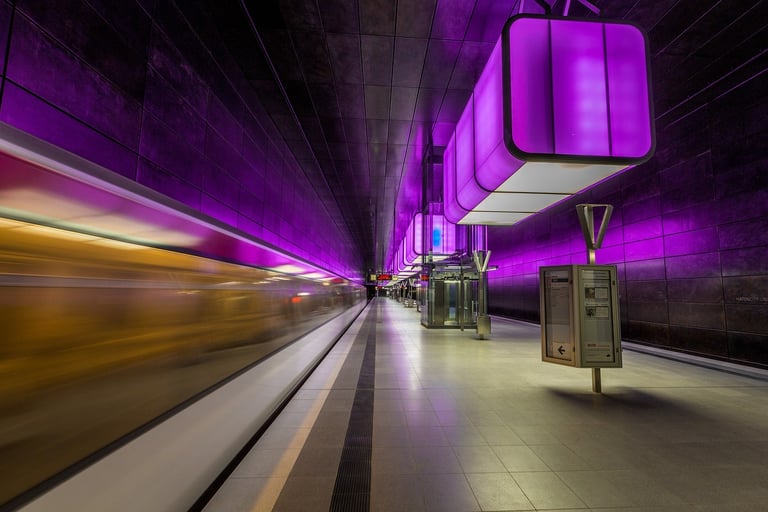The $100 Billion AI Bet: Why the Middle East's Big Move Should Matter to You
The Middle East is betting $100B on AI infrastructure. Discover how this bold move could transform cities and impact global smart tech leadership.
Pavan K. Das
4/21/20253 min read


“UAE to front global innovation with a $100 billion AI investment company.”
That headline hit me like a thunderclap. I was casually scrolling through the news, taking a break from my email chaos—and then boom, this.
Most people would scroll past. But for anyone even remotely curious about smart infrastructure, AI-powered cities, or the future of how we live and move, this isn't just a headline. This is a game-changer.
What’s Actually Happening in the UAE?
The United Arab Emirates just launched something big—MGX, a government-backed AI company. But MGX isn’t going it alone. It’s backed by Microsoft, BlackRock, Global Infrastructure Partners, and Abu Dhabi’s sovereign wealth fund. Together, they’re committing a potential $100 billion to reshape the future.
The focus?
Data centers
Power infrastructure
AI-powered urban systems
Smart traffic and mobility tech
In other words: they’re building the digital brain of future cities.




A Wake-Up Call for India (and Beyond)
Let’s be real. India has the brains. India has the talent. And yes—India has more traffic chaos than anywhere else on Earth.
So imagine:
A Tier-2 Indian city becoming Asia’s smartest city
A local startup building the continent’s best AI-driven road safety network
A pilot project in Bhopal or Coimbatore getting attention from Riyadh or Nairobi
This isn’t science fiction. It’s possible—right now.
Let’s Talk Action
If you’ve read this far, you're already tuned in. So here’s what matters next:
Think Locally, Observe Globally: Follow what’s happening in the UAE, Kenya, Singapore. These cities are test beds for our future.
Don’t Wait for Validation: Innovation doesn’t need permission. Cities that move fast will lead. Period.
Design for Now, Not Later: Build solutions for today’s pain points -
That 15-minute wait at a red light at 3 AM?
The waterlogged road you hit every monsoon?
Solve that. That’s where the magic starts.
Think Smarter Streets, Not Just Smarter Phones
This isn’t about flashy gadgets or cute robots. It’s about intelligent urban design.
Think:
Traffic lights that adapt in real-time
Roads that detect potholes before they form
Emergency response systems that predict crises
Energy grids that anticipate demand surges
It’s AI that lives in the city, not in your pocket.
"Okay, but that’s Dubai. How does this affect us?"
Excellent question. You’re not alone in thinking that. But here’s the thing: What starts in the UAE doesn’t stay there.
This is a global movement, not a local project. And the ripple effects are already spreading—Africa is on the move, too. Let’s take Nairobi, for example.
In 2025, they implemented AI-based traffic control across 125 intersections. The result?
Reduced traffic congestion
Faster commutes
Better urban planning insights
If Nairobi can do it, why not us?
Why the GAIIP Announcement Is a Global Signal
On September 17, 2024 — the UAE, BlackRock, Microsoft, and GIP — announced the Global AI Infrastructure Investment Partnership (GAIIP).
Here's what makes it massive:
Up to $100 billion in AI infrastructure investment
Focus on data centers, energy, and smart ecosystems
NVIDIA supporting with design of “AI factories”
Open collaboration across borders
Even the U.S. is benefiting, with much of the early infrastructure targeted there—yet this is clearly not just a Western project.
MGX CEO Ahmed Al Idrissi put it best:
“This infrastructure will enable growth and commerce in the future innovation economy.”
Let that sink in: AI infrastructure will be the next highway, the next railway, the next internet.
The Bigger Picture
AI isn’t just about code or chatbots.
It’s about:
How we move
How we work
How we govern
How we live
The Middle East is betting $100 billion on that future. Shouldn’t we bet on it too?
Your Turn
Here’s my challenge to you—yes, you reading this:
What if you built a micro-solution for your local city problem?
What if your college research tackled AI for urban development?
What if your startup partnered with city planners?
These aren’t pipe dreams—they’re blueprints waiting to be drawn.
This is our chance to lead, not just follow.
Final Thought
The future isn’t coming. It’s already happening. In Dubai. In Nairobi. In the press rooms of Microsoft. In the boardrooms of BlackRock.
So here’s the only question left: When do we jump in?
Let’s talk again next time. But until then—Keep building. Keep imagining. And keep showing up.




